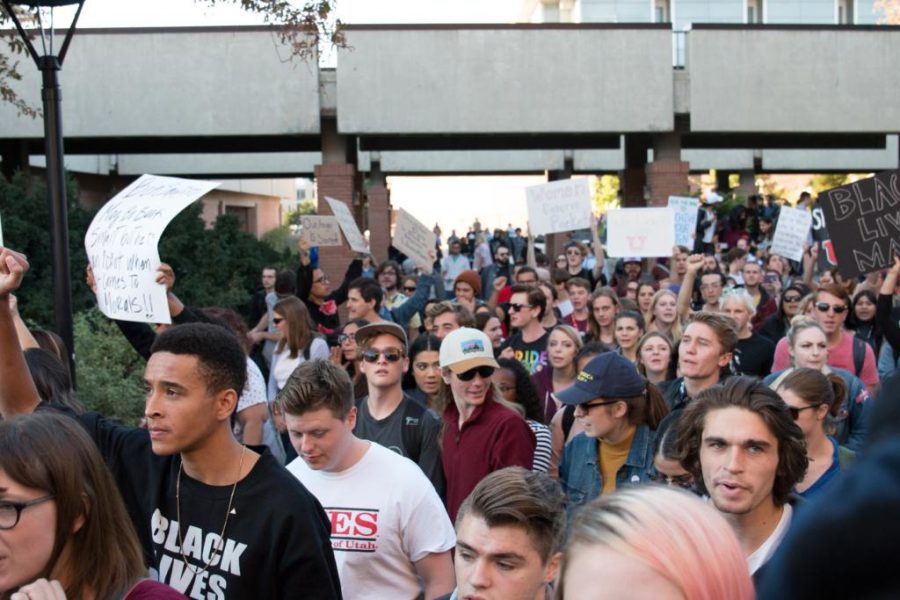Disingenuous reporting around stories related to college campuses is a staple of the American news cycle. The sensationalization of university life is a clickbait gold mine aimed to terrify baby boomers and malign the zeitgeist of younger generations. If the media was one’s only source for understanding the University of Utah, it would appear that campus was perpetually on fire, the alt-right and liberal extremists constantly at war. In reality, campus life at the U is perpendicular to this pessimistic portrayal.
The public’s perception of universities has been conditioned to synonymize campus life with outrage culture, violent protest and the suppression of liberties. This is nothing new — American universities have been feared as progenitors of social apocalypse as early as the Civil Rights era. Each decade, a new fear is dreamt up to counter a new generation’s progressive ideas, regardless of whether the ideas have merit or pose a serious risk. Every generation pivots from the values of the previous, and going to college is about developing the personal ideology that one is likely to keep for the remainder of life.
That’s not to say the U has not been subject to controversy and political strife. From the posting of white nationalist propaganda around campus to the Ben Shapiro protests turned violent to the national outrage over the Cry Closet art exhibit, a prospective student might wonder if they are going to be dragged into one of the many political conflicts on campus.
The answer, of course, is probably not. For the most part, the community at the U is dedicated to helping students accomplish their academic aspirations, no matter their personal ideology. If students are looking to get political, there are places and times to get involved and exercise constitutional rights like free speech. Some would argue that politics should sometimes interfere with academics, but I’ve yet to see a bunch of protestors barge into one of my classes. While students must prepare to meet people with radical ideas that they may not agree with, exposure to different thought is what a college is all about. It is unlikely to ever have another chance to meet so many passionate young people with compelling and wacky ideas.
Another fear of a prospective college student might be the criticism and shame of unintentionally offending someone. Common campus-related headlines like “Is Free Speech Under Attack?” are sure to draw in heavy views, but it also leads to the incorrect perception that no one’s ideas are safe on campus. This argument misrepresents the true objectives of the campus activists who protest against hate speech, guest speakers or offensive cultural norms on campus.
When put into historical context, most contemporary activists were advocating for expanding speech under extreme free speech suppression throughout American history. Communist and socialist ideas were violently suppressed during the McCarthy era, and the civil rights movement was actively suppressed in CIA operations such as COINTELPRO. Students also had their voices silenced over concerns around the Vietnam War.
It is the ideology of white nationalism and its advocates that has rarely been subjected to the systematic suppression of free speech. Popular white nationalist figures who claim college campuses are hotbeds of anti-free speech activities use this language to victimize themselves and distract from the more violent or regressive ideas within their movement.
When I was a freshman, I was afraid I might say or do something to offend my fellow students. Being raised in Utah — where the population is 93.3% white and majority Latter-day Saint — we’re kind of out of luck in the diverse experience department. I experienced a learning curve in which I have offended people and have said offensive things out of ignorance. Fortunately, the people I met at the U were more interested in discussion, reacting by explaining why what I said might offend someone instead of being outraged like the media claims.
Indeed, “patience with ignorance” is how I would describe my experiences on campus. No one on campus is actively looking for a fight — rather, everyone simply shares the desire to be respected and be treated with dignity. I can not stress enough how important it was for my growth to be able to have constructive conversations about controversial issues. Though people do have the right to be angry or upset when someone around says something offensive out of ignorance, most students understand that angrily calling them out and publicly shaming them can be counterproductive.
College is a time for growing in every area of your life. It means moving out of your parents’ house, meeting a diverse set of people and tackling real-world issues. Students will definitely experience uncomfortable situations where their ideas will be aggressively challenged, but these experiences are far more productive than they are embarrassing. My advice is to ignore the media and the warped public perception surrounding college campuses — in reality, freedom of speech and expression at the U have never flourished more than now.


